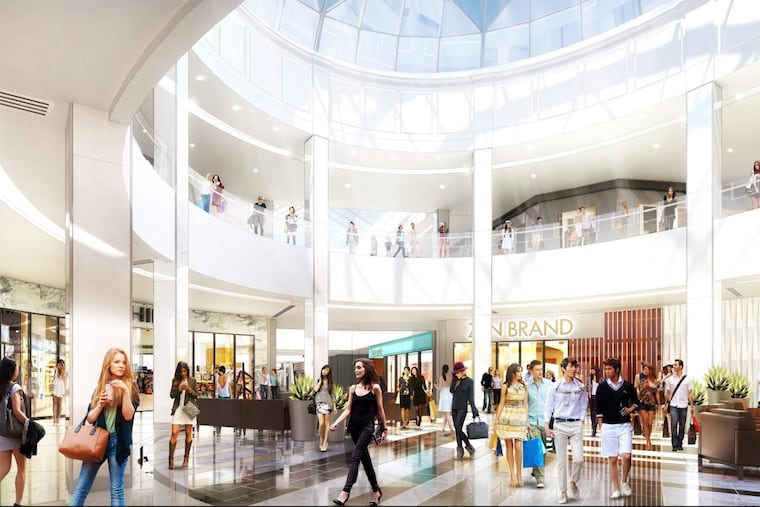King of Prussia Mall owner to invest millions in upgrades to aged 'Plaza' retail wing
The project follows the 2016 completion of a new 155,000-square-foot shopping and dining arcade that joined the former Plaza with what was once a separate building known as the Court at a cost of about $250 million.

The King of Prussia Mall owner Simon Property Group Inc. plans to spend millions on fresh tiles, new lighting, and other upgrades to an aging section of its suburban retail emporium as it seeks to sustain the upscale vibe that's helped make the property one of the nation's most valuable shopping malls.
Crews will begin renovations to the westernmost portion of the mall, once known as the Plaza, in April and complete them in June 2019, working only at night to minimize the effects on tenants and customers, Bob Hart, the property's general manager, said Tuesday.
The project follows the 2016 completion of a new 155,000-square-foot shopping and dining arcade that joined the former Plaza with what was once a separate building known as the Court at a cost of about $250 million.
The overhaul will be the former Plaza's first since 1994, Hart said. It entails replacing existing marble tile with pieces of a lighter shade, swapping out green metal handrails with new glass ones, upgrading metal halide and halogen light fixtures with brighter and more efficient LEDs, adding soft seating to corridors, and renovating restrooms.
The result will more closely match the style of the newly built connector and is meant to complement the high-end retailers that occupy the section's storefronts, including Apple, Hugo Boss, and Salvatore Ferragamo, Hart said.
"It's a newer, fresher, more elegant look," said Hart, who declined to specify a budget for the work beyond remarking that it would be a "multimillion-dollar" project involving hundreds of construction workers.
The King of Prussia Mall is a $2.8 billion asset for Simon, making it the eighth-most valuable mall in the country owned by a publicly traded real estate investment trust, according to a January research note by Boenning & Scattergood, a Conshohocken investment firm.
By comparison, the Philadelphia area's other suburban retail powerhouse, Pennsylvania Real Estate Investment Trust's Cherry Hill Mall, is valued at $768.3 million, according to the note.
Coming after the Court-to-Plaza connector's completion, the upgrades are Simon's latest step toward maintaining the King of Prussia Mall's value amid a downturn in brick-and-mortar shopping that has forced its erstwhile competitors in the region to reinvent themselves.
Nearby Plymouth Meeting Mall has come to rely increasingly on entertainment offerings such as the Legoland Discovery Center and the 5 Wits interactive puzzle venue, while Granite Run Mall is on its way to being transformed into a mixed-use district with homes and Children's Hospital of Philadelphia offices.
Even as it refreshes its retail spaces, the King of Prussia Mall is itself preparing for a major development initiative that Simon chief executive David Simon said last year in a conference call with analysts would be the company's " 'Hudson Yards' version for suburban, but wealthy, King of Prussia," in reference to the 28-acre development underway on Manhattan's far West Side.
Simon representatives have since declined to elaborate on those plans, which are expected to center on a section of the property once occupied by a JCPenney store.
Thanks to its massive scale and its location near Montgomery County's major roads, wealthy communities, and busy office districts, the King of Prussia Mall makes enough money for Simon to reinvest in necessary upkeep, said Douglas Green, a managing principal with the brokerage MSC Retail in Philadelphia.
"Consumers have no interest in being stuck in a mall that hasn't been touched in 20 years," said Green, whose company represented Shake Shack, KicksUSA, and other retailers with leases at the mall. "The minute you stop reinvesting in your mall is the minute you open up that consumer to the possibility of taking their shopping experience elsewhere."